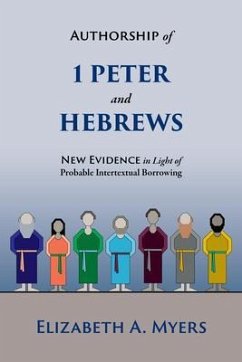OVERVIEW: Who wrote the books of the New Testament? Does it matter? Some might argue that the identity of the authors is irrelevant in light of divine inspiration that is believed to underlie the biblical writings. In truth, however, questions concerning authorship are vitally important for biblical studies today. Assumptions made about the human authors influence, not only the perceived authenticity and authority of the writings, but also interpretation of the texts. Historical-critical methods of NT interpretation rely largely on the historical context from which the author writes, which is difficult to ascertain for books of uncertain authorship. Conclusive answers to questions of authorship, however, often are elusive. Authorship of Hebrews, in fact, is one of the greatest mysteries of the NT, and although apostolic authorship of 1 Peter was largely uncontested throughout the Christian era, recent studies claiming pseudonymous authorship have posed serious challenges to the traditional view. In this book, Elizabeth Myers offers a fresh perspective on authorship of 1 Peter and Hebrews by taking a new approach that allows important new evidence to emerge. Myers first demonstrates that the author of Hebrews very likely knew and used the letter 1 Peter while crafting the epistle to the Hebrews. The matter of authorship then comes to light by examining the relationship between the Hebrews author and his/her sources. Focusing on why the author used 1 Peter as a source and how the author came to be acquainted with the letter, Myers discovers new evidence which not only shows that the author of Hebrews understands 1 Peter as having been authored by the apostle, but also reveals a striking portrait of the elusive Hebrews author which narrows the large field of proposed authors to just one credible candidate.
KEY FEATURES: Authorship of 1 Peter is illuminated by focusing on why the Hebrews author chose to use 1 Peter as a source. Hebrews bears witness to the authorship of 1 Peter through a trail of literary clues about how the author regards his/her sources, which leads to the conclusion that the author most likely understands 1 Peter as authentically apostolic. Authorship of Hebrews is addressed by focusing on how the author came to be acquainted with 1 Peter. This includes testing the hypothesis that the author was among the original recipients of 1 Peter. Hypothesis testing involves the use of detailed multi-faceted profiles of the original receiving community of 1 Peter, the original receiving community of Hebrews, and the author of Hebrews. Analysis shows that the hypothesis is not only plausible, but very likely. The author's identity is illuminated through construction of an identity profile that considers his/her status as an original recipient of 1 Peter, as well as his/her understanding of appropriated sources. The identity profile reveals distinguishing features of the author's lifetime and lifespan, educational background, vocation, geographic location when defining events occurred, and community affiliation, as well as the agent responsible for the author's evangelization and some important restrictions. The identity profile is used to evaluate 15 proposed candidates for fitness to be the author of Hebrews. The outcome delimits the proper historical context for exegetical study of 1 Peter and Hebrews. It narrows the range of dates during which the books could have been written and identifies the likely provenance, intended destination, and original recipients of both books. The front matter includes a list of contents, a list of 21 figures, a list of 44 tables, and a list of abbreviations. The back matter includes appendices with tables of supporting data from the analyses, a list of works cited, an index of Scripture and other ancient sources, and an index of modern authors.
KEY FEATURES: Authorship of 1 Peter is illuminated by focusing on why the Hebrews author chose to use 1 Peter as a source. Hebrews bears witness to the authorship of 1 Peter through a trail of literary clues about how the author regards his/her sources, which leads to the conclusion that the author most likely understands 1 Peter as authentically apostolic. Authorship of Hebrews is addressed by focusing on how the author came to be acquainted with 1 Peter. This includes testing the hypothesis that the author was among the original recipients of 1 Peter. Hypothesis testing involves the use of detailed multi-faceted profiles of the original receiving community of 1 Peter, the original receiving community of Hebrews, and the author of Hebrews. Analysis shows that the hypothesis is not only plausible, but very likely. The author's identity is illuminated through construction of an identity profile that considers his/her status as an original recipient of 1 Peter, as well as his/her understanding of appropriated sources. The identity profile reveals distinguishing features of the author's lifetime and lifespan, educational background, vocation, geographic location when defining events occurred, and community affiliation, as well as the agent responsible for the author's evangelization and some important restrictions. The identity profile is used to evaluate 15 proposed candidates for fitness to be the author of Hebrews. The outcome delimits the proper historical context for exegetical study of 1 Peter and Hebrews. It narrows the range of dates during which the books could have been written and identifies the likely provenance, intended destination, and original recipients of both books. The front matter includes a list of contents, a list of 21 figures, a list of 44 tables, and a list of abbreviations. The back matter includes appendices with tables of supporting data from the analyses, a list of works cited, an index of Scripture and other ancient sources, and an index of modern authors.
Dieser Download kann aus rechtlichen Gründen nur mit Rechnungsadresse in A, D ausgeliefert werden.


